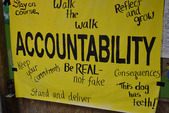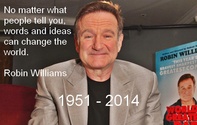Imagemakers International
|
"I'm not sitting across from her", I can remember her saying quietly, as she stood at the Christmas Dinner table. Recognizing the need to be comfortable, she quickly shifted her position so she wasn't forced to "look her in the eye", throughout the meal. Breathing a sigh of relief, she relaxed as did everyone else. Aaah the family Christmas Dinner. We can laugh at this scenario because - let's be real - we've all been there. It's the place we not only gather for a great meal, it's the place that unresolved conflicts seem to rear their lovely and not-so-pretty heads. Tension and stress often builds, well in advance, as we do our best to be "civil" to one another. How sad I often think, that the very relationships that are meant to support and elevate us, often bring us down. Holding our spirits captive and deprived of joy, not only at Christmas, but throughout our lives. Knowing this is something we have all faced and will face, what if we were to create a new tradition by giving the gift of forgiveness to ourselves and others? The Gift of Forgiveness
0 Comments
Are you a Genuine Leader? If you want to attract and engage the best talent, improve performance and optimize results, it should come as no surprise that it all begins and ends with leadership. What may be surprising to many, however, is that leadership in the 21st Century is no longer just about rank, title or position. Instead, it's about knowing who you are, the values you uphold and the impact your actions will have on the lives of others. As we see it then, everyone has the opportunity to be a leader and the need for genuine leaders, has never been greater. To help people on that path, we’ve come up with a checklist that helps to define what a genuine leader is. Why not see how well you fare? A genuine leader is someone who:
So, are you a genuine leader? Take a moment to acknowledge the leadership qualities that are within you and those that you may need to work on. When you do, you will be well on your way to becoming a genuine leader and the kind of person others are inspired to emulate. ©2014 Kimberley Whiten-Richardson - Imagemakers International. All rights reserved. The passing of Robin Williams has evoked many feelings and sentiments and I find myself trying to understand why? I never knew him as a person, didn't follow him as a comic, but I do remember that when he entered my world as Mork, he made me laugh - a lot. And now, for many reasons, I am experiencing a deep sense of loss.
Like so many others, I've found myself searching for answers and wondering how a man with such extraordinary wit, brilliance, success and love, could leave this world as he did. Yes I know that I’m not the first to ask that question, but my desire to attempt to answer it for myself, is important. Over the past week, we've all come to hear about the deep and dark places his mind took him to. Places where he was left feeling alone, afraid, anxious and fearful. We’ve also learned that he suffered deeply from depression and was in the initial stages of Parkinson’s – a debilitating disease that impacts the nervous system and the mind, ultimately leaving the person incoherent and deprived of their essence. But why we ask, would he end his life? Aren't there other celebrities like Michael J. Fox, who turned their diagnosis into a triumph – increasing awareness, moving forward and inspiring research into this disease? Why couldn't he have done the same thing? Perhaps the answers lie in the fact that Robin's essence was his genius, wit and unquenchable desire to make people laugh. That was his raison d’etre. His reason to be. So maybe there is a possibility that the thought of no longer being able to be himself, was essentially life threatening to him. And before the disease would take him, he would claim his life so that "who he was" could and would, remain in tact. And now, everyone who knew him personally and those of us who didn't, have been forced into a state of reflection, grieving the loss of the joy, laughter and inspiration he gave us - remembering him just as he was. And remember him, we will. His passing has made me realize that one life can truly make a difference. His death has raised awareness of the power of depression and that no one is exempt. According to the America Foundation for Suicide Prevention, on the evening of Robin's death – they received the highest number of calls – in it's 27 year history. The upside to the downside of this tragic loss is that many lives were likely saved, awareness increased. Depression is a dark, dark place that its victims do not choose to venture to. It is almost always triggered in adolescence by the culmination of experiences, people and relationships that have left an indelible wound. Having being surrounded by this dark devil in my own family, I know for certain that people do not choose to go there. They encounter a feeling of hopelessness, fear and despair that consumes their life. And we must understand that words like, "get over it", "you have so much to live for" or "be grateful", though well intended, may diminish their spirit even more. As such, we must do our very best to be more sensitive and understanding and to take off the lens of judgement for "we judge because we’ve either been there or we haven’t been there yet."1 Yes, sadly this great comic and human being, has met a tragic ending. His mask removed, we are deeply saddened by what we now know and see. He made us laugh until we cried and now, wondering how anyone can fill that void. They can't and won't because he was truly one of a kind. We will mourn the loss of his genius, humour and humanity, but perhaps the loss of something even greater - the light of someone who gave us joy and brightened our lives. A man who saw the silliness in everyday happenings and made us laugh at ourselves. And now, in his passing, forcing us to think, look within and see the humour and the irony, in our own lives. If we are to keep his legacy alive, let us all have more compassion and understanding for one another. Let’s do our best to take life seriously, but not ourselves. Let us all strive to be kinder, more understanding, gentle, loving, forgiving and true to ourselves. And most importantly, let's strive to laugh more and often. Doing so, may just save another life – not the least of which, our own. May his beloved family and friends take comfort in knowing that he made a difference in so many people's lives and left a legacy of love and laughter that we can all be inspired to emulate. May his soul rest in peace. Nanu Nanu! 1. Footnote: Frank Raso 2013 The Call of the Loons - Communicating from the Heart I've just returned from three glorious days at our family's small island cottage. The weather was perfect and each day greeted me with vibrant sunrises, blue skies and magical sunsets. As a heavy rain poured down late one evening, I could almost hear the trees laugh as they were refreshed, once more. With every visit, I am compelled to savor the richness and magnificence of nature and I remain both humbled and inspired. I am so grateful to my grandmother and my parents, for gifting us with their love and the joy this place brings to us all. Here, there is no electricity, cell phone or internet access - everything runs on propane, simplicity and serendipity. The only important calls you receive are the ones most Northern Canadian cottagers yearn to hear - the ethereal, magical and haunting call of the loon. As I hear their calls, I am inspired to be still, to listen carefully and to take each one in. They seem to connect with the very depth of my soul and once heard, they are never forgotten. Why is that, I thought? Intrigued to learn more, upon my return I did some research and learned that there are four distinct calls which vary both in length and depth. The most common one heard - is a tremelo - a wavering call that is to indicate alarm or to announce it's presence at the lake. The next is a yodel which is the male loon’s territorial claim. The wail is the haunting call that loons give back and forth to figure out each other’s location. And finally, hoots which are soft, short calls given to keep in contact with their mates and between parents and their chicks. (Source:1) Fascinating stuff, I thought! Upon reflection, I know now why I hear them so clearly: this kind of communication is deeply lacking amongst human beings today. Each of their calls allow them to connect with each other in a deep and meaningful way. They know what they want to say in each situation and they do so, clearly, distinctively and concisely. And perhaps, most importantly, they communicate from the heart with care, concern and love for one another. So perhaps we would be wise to take a page from their book and apply some of the lessons I've learned from the loons: 1. Be clear and concise in your communication with others 2. Speak from the heart - it strengthens all connections 3. Listen clearly to what the other person is saying - you will improve the outcome 4. Be aware of your volume, speed and tone - you will build rapport and be heard 5. Listen more than you speak - there is no communication without it 6. Give a hoot from time time - we need to stay in touch with one another 7. Hearing the sound of someone's voice strengthens relationships - make the call 8. Master your vocal image - your voice is part of your brand and your signature 9. Unlike loons, humans feel the impact of words spoken - choose them wisely 10.Communicate with compassion and respect - it's part of human nature! And lastly, be authentic and true to who you are. Otherwise, sooner or later, others will call you on it! Source: 1: http://www.allaboutbirds.org/guide/common_loon/sounds Is Accountability the Key to Success? "Accountability is about taking responsibility for our thoughts, feelings and actions and in turn, igniting our potential." ~ Imagemakers International Over the past 18 years, the one question we've been often been asked is: "How do I get my people to be more accountable?" To answer that question, we would have to begin by asking their leaders how they actually define accountability. Having done so, the definition varies considerably from one person and one organization, to the next. So what does accountability really mean and is it the key to success? From our perspective, accountability is about taking responsibility for one's thoughts, feelings, actions and outcomes. It's about discovering who you are, building trust and cultivating respect and in turn, taking yourself and your life to a whole new level. Here are a few more insights, that may help you achieve those goals: 1. Recognize what being unaccountable vs accountable looks and sounds like People must appreciate that being accountable is not about fault or blame. Those who makes excuses or blame the past and/or other people for who they are and what they can and can not do, often see themselves as victims of circumstance. If you're someone who finds themselves asking questions like, "why do these things always happen to me?" or "who's to blame for this" or making a statement like, "it's not my fault that...", you may be living an unaccountable life . And if you are, you are holding yourself back from reaching your full potential. By contrast, when you do take responsibility for your life and your actions and become accountable, you take yourself to a much higher level. When adversity happens, begin instead to ask questions like, "what can I learn from this", "what can I do differently next time" or "what internal resources do I have to overcome this?" When you do, you become a victor rather than a victim and this is key to reaching your full potential, building self-respect and earning the respect of others. 2. Do your part to inspire a learning culture. The old school of leadership presented accountability from a fear-based perspective. ie. admitting a mistake meant "you're in trouble, you're wrong or worse case, you're next." How can anyone be inspired to learn from their mistakes when shame, embarrassment and a diminished human spirit is the outcome? Genuine leaders inspire a learning culture by approaching accountability from a much more human perspective. They help their people understand that making a mistake is not the end of the world, but rather an opportunity to learn and grow. The result: the individual's dignity is left intact, role models are created and innovation and creativity are unleashed. It only takes one person to set this example and when nurtured, it will begin to transform both the individual and the entire organization. 3. Bring out the best in others and reap the rewards. One of our seminar participants recently told us that he'd had ten executive assistants in as many years. What does that say about him? Well, it's not what you think. When a mistake was made, he encouraged them to acknowledge it and said, "Let's fix it, learn and move on." As a result of his actions, he brought out the best in others and helped his people shine and guess what? Each of them did move on - they were all promoted and in very short order. 4. Demonstrate personal accountability so that others can follow your lead. "Show me, don't tell me", was always one of my father's favourite expressions. Genuine leaders are wise to follow this advice and must lead by example. To be effective, they must ask themselves three important questions:
Learn more...Leadership Programs: ©2014 Kimberley Richardson - Imagemakers International. All rights reserved. |
Kimberley RichardsonKimberley is an inspirational speaker, seminar leader and executive coach. She inspires people to become genuine leaders and in turn, the kind of person others are inspired to emulate. Archives
October 2015
|


 RSS Feed
RSS Feed
